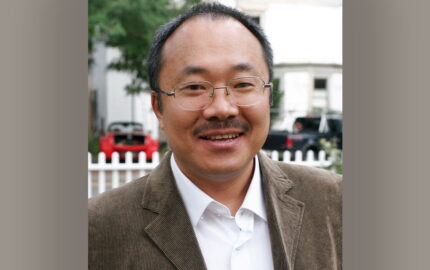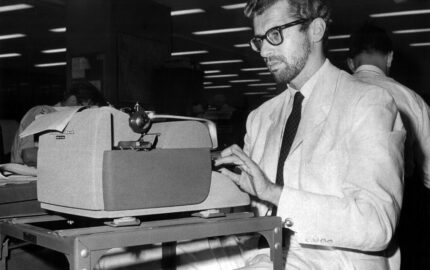Mark Trahant, who for more than five decades has worked for and led newsrooms in the American West, has been selected for the 2025 I.F. Stone Medal for Journalistic Independence in recognition of his lifelong dedication to journalism and commitment to Native American storytelling.
A member of the Shoshone-Bannock Tribe of Idaho, Trahant directed the revival of Indian Country Today after the news organization briefly stopped publishing in 2017. He rebranded the company as ICT, increased its coverage of Indigenous communities across North America and expanded the staff from three to more than 30 employees by 2024. Now thriving as an independent multimedia nonprofit, ICT distributes a weekly newscast to public television stations across the U.S. and audiences in Canada and Australia. ICT is headquartered at the Walter Cronkite School of Journalism and Mass Communication at Arizona State University.
Trahant stepped down from his role as editor-at-large at ICT in January 2025.
I.F. Stone Medal jury member Jasmine Brown noted: “For over 50 years, Mark Trahant has been a trailblazer — a reporter who broke down barriers and made sure the road was easier for those coming behind him. Mark sounded the alarm about the need for more Indigenous journalists in newsrooms and when no one listened, he created.”
Ricardo Sandoval-Palos, chair of the I.F. Stone Medal Selection Committee, added, “One of the pillars of I.F. Stone’s work was its holding strong light to matters too often overlooked by national media. In Mark’s work — in his outstanding career — we see a similar standard. The coverage he initiated with ICT and the high bar he set with his early work on corruption in government oversight of Indigenous affairs form a legacy that’s improved the lives of many in this country. His work is an example we should all strive to emulate.”
Notified about his selection for the I.F. Stone Medal, Trahant said: “When I was a teenager, I watched the film ‘I.F. Stone’s Weekly.’ It immediately hit a chord. I started reading everything I could about Stone’s work and how he defined what an individual journalist can do. Many of the tribal publications I have worked for had tiny staffs, but that never limited our aspirations. We knew we could do the work and deliver scoops.
“The importance of Indigenous journalism grows as this country gets larger. It’s impossible to understand this country’s history — and its future — without including the people who have a 10,000-year history. So many of the problems we face today seem new, until you know how it fits into a longer arc. I am honored to accept this I.F. Stone Medal. I see it as a call to do more.”
Years of serving the public
Trahant has served as editorial page editor at the Seattle Post-Intelligencer; columnist at The Seattle Times; editor and publisher of the Moscow-Pullman Daily News; executive news editor at The Salt Lake Tribune; reporter at the Arizona Republic; and editor and publisher of The Navajo Times. He also started The Navajo Nation Today, a weekly newspaper/magazine, and worked for the Sho-Ban News.
Trahant additionally has reported for PBS’ “Frontline.” One of his stories, “The Silence,” examined sexual abuse by priests in an Alaska Native village. From 2009-10, Trahant was a Kaiser Family Foundation Media Fellow, writing about healthcare reform and the Indian Health Service.
As a blogger and independent journalist, Trahant has used new digital tools to focus on public policy, including the creation of a database that charted the number of Native Americans running for state and federal offices.
In 1988, Trahant was a Pulitzer Prize finalist for national reporting, recognized for a series he co-wrote for the Arizona Republic. The articles exposed corruption and mismanagement in federal Indian programs nationwide, including those overseeing oil and gas resources on tribal lands. The reporting led to the creation of a special Senate committee to investigate the problems.
The Native American Journalists Association (now called the Indigenous Journalists Association) and the Society of Professional Journalists both named Trahant “Best Columnist” for “West by Northwest,” his twice-weekly column in The Seattle Times. Trahant also received a Ruhl Fellowship and was co-winner of the Heywood Broun Award, which honors journalism that exposes social injustice. In 2019, Trahant received the IJA-Medill Milestone Achievement Award.
Trahant has served as president of the Native American Journalists Association, chairman of the Robert C. Maynard Institute for Journalism Education and public information officer at the U.S. Bureau of Indian Affairs in Washington, D.C.
He has shared his experience and expertise as a journalism professor at the University of Alaska Anchorage and the University of North Dakota. He was also an editor-in-residence at the University of Idaho’s School of Journalism and Mass Media and a visiting lecturer at the University of Colorado Boulder.
Trahant is the author of “The Last Great Battle of the Indian Wars,” about Sen. Henry Jackson and Forrest Gerard, the first Assistant Secretary of Indian Affairs and a member of the Blackfeet Tribe of Montana, who worked for tribal self-determination in the 1970s, and “Pictures of Our Nobler Selves: A History of Native American Contributions to News Media.”
In 2017, he was elected to the American Academy of Arts and Sciences, and in 2023, he was inducted into the National Native American Hall of Fame.
Trahant writes a daily news poem on Instagram, @TheNewsRimes.
Established in 2008, the I.F. Stone Medal honors the life of investigative journalist I.F. Stone and is presented annually to a journalist or journalists whose work captures the spirit of independence, integrity and courage that characterized I.F. Stone’s Weekly, published from 1953 to 1971. Trahant will receive his medal during a ceremony at the Nieman Foundation in May. The award is administered by the Nieman Foundation for Journalism at Harvard.
An independent committee of journalists chaired by PBS Public Editor Ricardo Sandoval-Palos oversees nominations and selection of the medal winner. Committee members are Jasmine Brown, a senior producer at ABC News’ “World News Tonight with David Muir” and a 2020 Nieman Fellow; Bernice Yeung, managing editor of the Investigative Reporting Program at UC Berkeley’s Graduate School of Journalism; Michael Riley, an investigative reporter for Bloomberg News and Businessweek magazine; and Phillip W. d. Martin, a senior investigative reporter for the GBH News Center for Investigative Reporting and a 1998 Nieman Fellow. Myra MacPherson, author of the biography “All Governments Lie: The Life and Times of Rebel Journalist I.F. Stone,” is a juror emerita.
The Nieman Foundation for Journalism at Harvard educates leaders in journalism, promotes innovation and elevates the standards of the profession. More than 1,700 journalists from 100 countries have been awarded Nieman Fellowships since 1938. The foundation also publishes Nieman Reports, a website and print magazine covering thought leadership in journalism; Nieman Journalism Lab, a website reporting on the future of news, innovation and best practices in the digital media age; and Nieman Storyboard, a website showcasing exceptional narrative journalism and nonfiction storytelling
Learn more about Mark Trahant’s work



